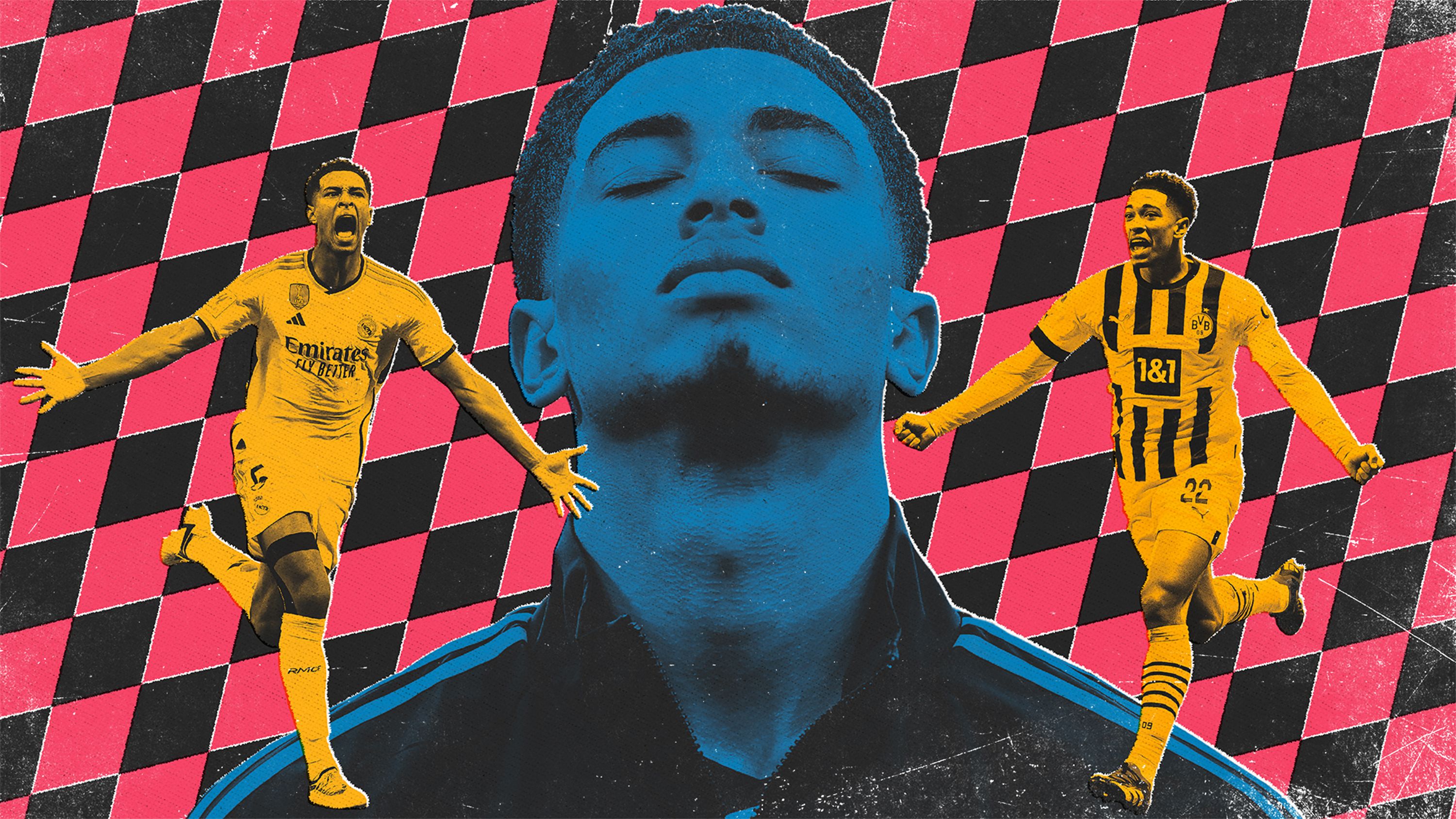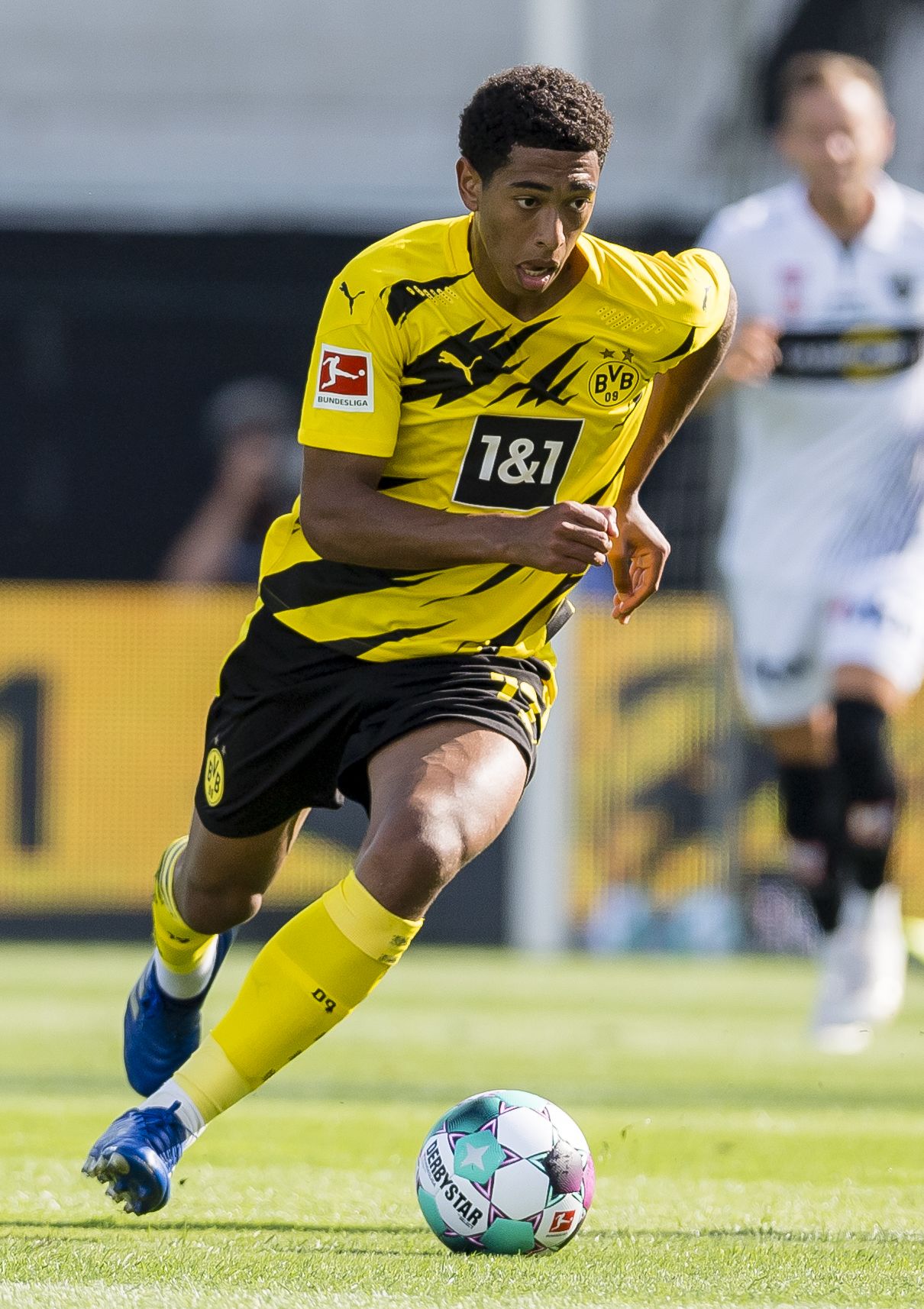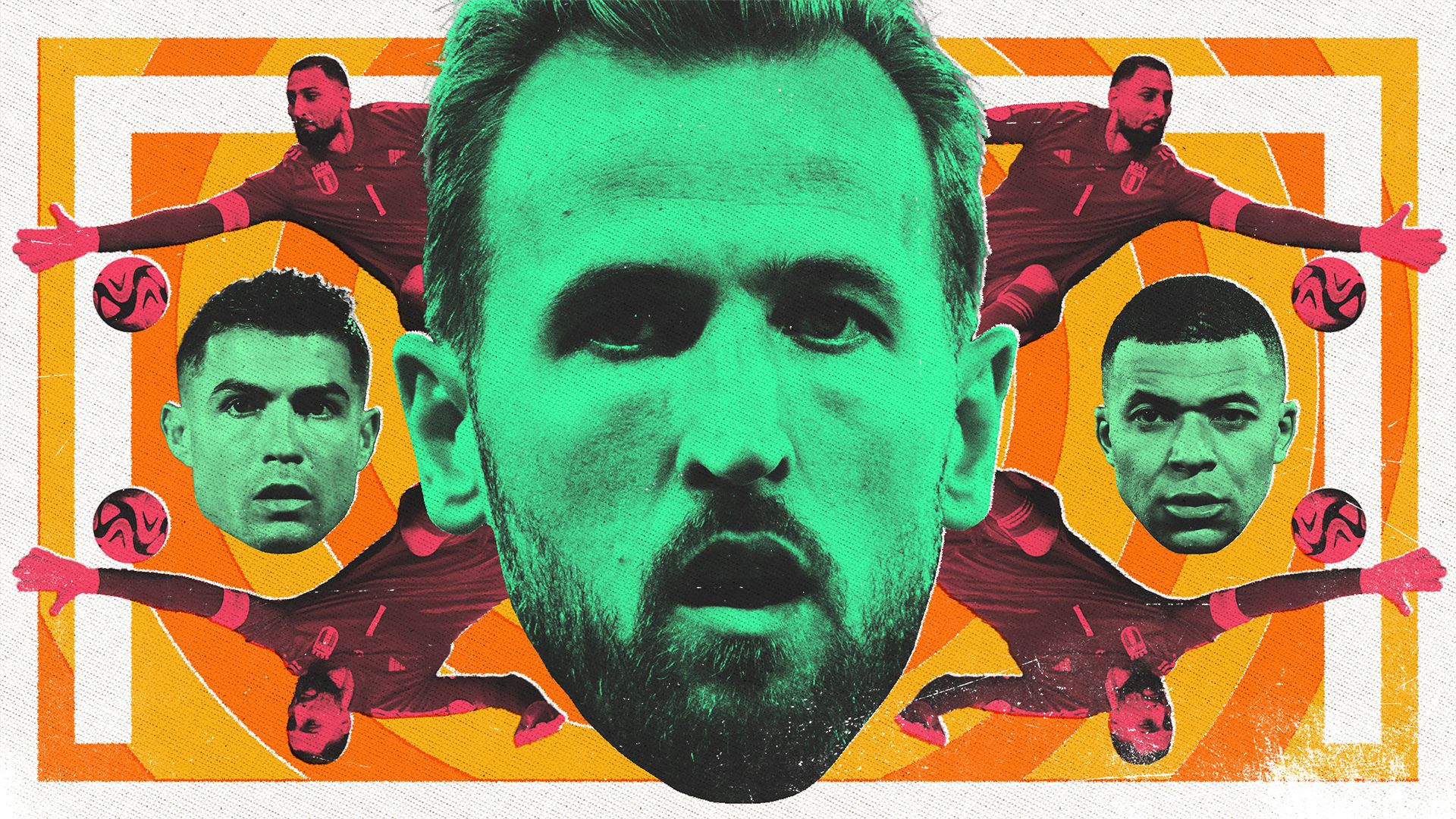Jude Bellingham
Combine large, bold images with the beautifully crafted words of your story.


Boy prince Bellingham
ready for biggest stage
If you listen hard enough, Jude Bellingham has been telling us for a while.
In October, he strode back out into an emptying Wembley.
He had destroyed Italy that night, dropping deep, dancing through tackles, popping off passes and setting up two goals in a 3-1 win that booked England's place at Euro 2024.
He was player of the match on the pitch. He was about to become performer of the night on the post-match press duties.
"I'm getting a little bit better every time I play," he said with a bashful smile in response to praise from a presenter at the start of a live television interview.
Eight minutes later, when Bellingham shook the hands of the television team - firm grasp, solid eye contact, first-name terms – and headed back down the tunnel, the pundits were swooning.

The eloquence, the intelligence, the manners, the mega-watt smile; it was dazzling. The brightest of superstars came over as the most welcome of son-in-laws.
But his words had been revealing.
"I have to deliver. I have to be that one that kind of tries to decide games, whether its with a goal or an assist, or a match-winning performance."
"I know there are going to be low moments, games where I don't score, and I am going to become an easier target for people who don't want to see me do well."
"We've almost been a little too fair, we have come up against some teams and they are just a bit more savvy, a bit more smart than us."
"I am loving the opportunity to steal stuff and add it to my game."

There is grit at the centre of the pearl, a barb hidden amid the beauty. Bellingham's ego, like all great players, is indefatigable. His ambition is insatiable. His standards are uncompromisingly high.
Now, under the spotlight of a major tournament, the sheen is see-through.
Harry Kane may wear the armband, but no-one carries England's burden as comfortably as Bellingham.
The 21-year-old is leaning on every lesson learned and drawing on deep wells of self-belief, to bend Euro 2024 to his will and turn scrap performances into silverware for England.

The 17-year-old icon
The social media response was scathing.
"The most embarrassing thing a football club has ever done," said one user. "Tinpot," said another. "Pathetic," said a third.
They were reacting to Birmingham retiring Bellingham's number 22 shirt.
Birmingham explained their decision like this: Bellingham was an "iconic figure" noted for his "talent, hard work and dedication"; removing the number 22 from their roster would be a gesture to "remember one of our own and to inspire others".
But Bellingham was just 17. He had played only 44 games and a single first-team season for the Blues. To its critics, Birmingham's decision was hype-fuelled froth.
There was context however. Bellingham is truly one of their own.
Born in Stourbridge, 10 miles west of Birmingham, he joined the Blues aged eight.
"What a place, what a city, what a club," Bellingham said in an interview in 2021.
"It is always the first score I check, I am always watching the games when I can, it means so much to me that club."
He may have been part of Birmingham's set-up since primary-school age, but his football education began lower down the ladder and closer to home.
His father Mark was a prolific striker in the West Midlands lower leagues, scoring more than 700 goals in a career that stretched into his mid-40s.
A young Jude didn't really watch football on television. Instead, he would see the glory and physicality close up on the Saturday morning sidelines of his father's games. It left an impression.
“I used to watch him play all the time; it’s where I started to get that love for football," he told the Guardian.
"That non-league style of toughness and being gritty when you need to be is reflected in my game. That comes from watching my dad play – even though he never tackled!"
Jude did tackle. And pass. And dribble. And create.
Such was the completeness of his midfield game that his coaches gave him the number 22 shirt – the one that Birmingham would later retire – as a reminder.
It was the total reached by combining the numbers of a defensive anchorman (four), a box-to-box touch merchant (eight) and a final-third creator (10).
It didn't take much calculation to see Bellingham was a rare talent though. Few players have passed the 'eye test' so conclusively.
He covered the ground in a languid, liquid gallop, nimbly retained the ball with deft touches and dropped shoulders and invariably chose the right option to put his team in a better position on the pitch.
He made his Birmingham first-team debut just a month after his 16th birthday, starting a 3-0 EFL Cup defeat by Portsmouth.
Three weeks later, he marked his home debut with the winning goal against Stoke. He never looked back.
He made 44 appearances that season to a backdrop of increasing speculation.
Premier League scouts wrote back with glowing reports.
Arsenal were already well on his trail, having tried to prise him away from St Andrew's as a 14-year-old.
But it was Manchester United who came on strongest.
Bellingham was given a tour of the training ground in early 2020. United's pitch centred on the number seven shirt. Eric Cantona and Bryan Robson - two of its most famous occupants - were on hand to greet him and his family.
Sir Alex Ferguson and the then-manager Ole Gunnar Solskjaer told Bellingham he could be similarly instrumental in United's future.
However, Bellingham's father Mark, who oversees his sons' careers, was not convinced.
Paul Pogba and Bruno Fernandes led the queue for United's midfield spots, with Scott McTominay, Nemanja Matic and Fred also in the squad. The scrutiny, even on the fringes, would be unforgiving.
German side Borussia Dortmund couldn't offer as much money or as high a profile, but their record of developing young players quickly and well was the clincher.
Jadon Sancho, the English winger who had swapped Manchester City for Dortmund, was most often cited, but Ousmane Dembele and Christian Pulisic's successes showed it wasn't a one-off.
Bellingham let United down gently. They signed Donny van de Beek instead.
There was, however, one final bit of business before Jude could move.
Under league rules, Bellingham, only 16, was ineligible for a full professional contract before his 17th birthday. Instead he was a star on scholarship terms, earning only £145 a week.
In theory, Bellingham could have walked away from Birmingham in the summer of 2020, with the club receiving negligible compensation.
In practice, he couldn't. The relationship between the club and family was worth more.
After turning 17, Bellingham signed a professional contract at Birmingham, one both he and they knew would never be fulfilled. But it meant that Dortmund would pay Birmingham a fee of up to £30m - a record for a 17-year-old - to secure Bellingham.
Whatever his status on the teamsheet, Bellingham is a legend on the Birmingham balance sheet.








A mother's son
If watching his father shaped a young Bellingham, it was under his mother's eye that he has grown into one of the world's best.
When Jude moved to Germany, amid the coronavirus pandemic, the Bellingham family had to divide.
Mark's work with West Midlands Police kept him in the UK with Jude's younger brother Jobe. Bellingham's mother Denise would accompany him as he adjusted to a new life in a different country.
The pressure was great. The spread of coronavirus had shut grounds and put Dortmund's finances under strain. Bellingham, just 17, was their only summer purchase. He was welcomed by a video of Dortmund's squad serenading him with the Beatles hit Hey Jude.
At his unveiling, as he gazed around the Westfalenstadion, he looked like a fan who had drifted away from a stadium tour, rather than a signing.
But, that impression was quickly dispelled. He won over his team-mates with his commitment to duels in training. By the end of the season, he had won over the rest of the league and was named the Bundesliga newcomer of the year.
Over the next two campaigns, he grew into his frame and expanded his role. A marauding midfield presence, both creative and destructive, his improvement was at a break-neck gradient.
And all the while, Denise was behind the scenes, making sure his rise was kept straight and narrow.
She would look after the finances, make him meals and drive him to training.
When he forgot his passport before flying for a Champions League game, she came to his rescue, driving up to departures clutching his papers.
When England's players found out at the 2022 World Cup that she would make Bellingham's bed for him every morning, the ribbing was long and loud.
By summer 2023, it had been suggested that the Bellinghams' cross-continental living arrangement might come to an end.
He was fast outgrowing Dortmund.
At times, he became visibly frustrated with his team-mates' inability to match his stratospheric performances, reacting angrily to their mistakes on the pitch.
With two seasons left on his contract, the Bundesliga player of the season award bagged and Dortmund's long-standing policy of buying young and selling high, it was clear that a move might suit all parties.
Initially Liverpool were reported as favourites - a move that would have enabled the family to reunite in England.
Manchester City apparently entered the race late.
But ultimately, the financial muscle and sepia-and-silver lustre of Real Madrid won out.
Dortmund pocketed £88.5m - triple the fee they had paid three years earlier - and Jude and Denise's double-act headed to the Spanish capital.
"It might have been an easier option to go back to England, my native country, and live there and play there in the Premier League," Bellingham said.
"But it's just I couldn't turn down Real Madrid. I like the idea of being out of my comfort zone."
The move certainly took him to new places.
Bellingham's role was tweaked once more. With Real's midfield already stocked with a wealth of ball-players and high-octane pressers, he advanced into an attacking role, scoring 23 goals in 42 appearances.
He got street-smarter too. He drew more fouls than any other Real Madrid player, with the fourth-highest total in La Liga, and committed more than all but one of his team-mates.
His trash-talking transcended language barriers, earning a red card for his reaction to one Spanish official and appearing to get in the ear of fellow Englishmen Mason Greenwood and Harry Kane.
Real Madrid's realpolitik - how to frustrate, filibuster and win ugly - was added to his repertoire.
Some things remained the same, though.
Before October's Ballon D'Or ceremony, Denise circled around her suited son in a Parisian hotel room, fixing his bow tie for him.
"All of them people are like, 'he's so mature'," joked Bellingham.
"I can't even get changed on my own. My life is a lie."
In June, Bellingham returned the favour, helping his mother with her own neckwear. After Real beat Borussia Dortmund at Wembley to add the Champions League to their domestic title, he sought her out in the stands and hung his winners medal around her neck.
"Jude Bellingham is made up of amazing people," said Bellingham earlier this summer. "It's not just me."

England’s main-character energy
England have never had a shortage of superstars.
Michael Owen was a prodigy at the 1998 World Cup. Wayne Rooney made a similar breakthrough at Euro 2004. Steven Gerrard, Frank Lampard and Paul Scholes occupied the same midfield. David Beckham operated on another intergalactic level of fame.
But none played with quite the same aura as Bellingham.
Against Serbia in England's opening game of this tournament, he dominated the stage. He scored the only goal - a typical late run into the box, a brave header - but it was more than that.
There was a swagger and a self-possession that, for all the big names, England lack.

International duty has tended to be just that for England - a weighty, collective obligation. Other players, all stiff limbs and upper lips, seem to be walking a tightrope, weighed down by decades of hurt and the dreams of millions back home.
Even for the best, there is a premium on perspiration. England shirts traditionally have to be filled with humility and honest, hard work.
It rarely looks either personal or pleasurable.
For Bellingham, it seems both.
He responded to Serbia's physicality in the opening match with gleeful grace - pinging a needlessly extravagant volleyed pass across field - and a few digs of his own - shoulder-barging a red shirt before exhorting more noise from the white ones in the stands.
When the final whistle blew, Bellingham climbed off the bench with a single digit raised to the skies.
One goal, one story, the indivisible first person singular.
"He has come out there with the attitude that 'this is my game and I am him'," said Rio Ferdinand.
"That is the vibe - the gestures, shoulders back, the way he walks around the pitch - he knows, believes and understands that he is the guy."
Perhaps it is a product of his club career, away from the hubris and neuroses of the Premier League.
Perhaps it is the security of his upbringing, that give him the perspective to express himself on the pitch.
Perhaps it is confidence of knowing that, so far, when you are Jude Bellingham, the plan always comes together.
When England teetered on the precipice, five minutes deep into injury time and a goal shy of Slovakia in the last 16, inevitably it was he who filled the moment.
A bicycle kick, a shout of 'who else?' to the substitutes and a 'cojones' gesture to the stands - it was as if the protagonist had decided the end credits weren't ready to roll just yet.

Bellingham hasn't been England's best player at this tournament.
In the semi-final against the Netherlands, he was largely anonymous - his most memorable moment coming when he scampered down the line and drew a foul as he ran down the injury-time clock.
Given the depth in his position, he might not be England's most important player either.
Phil Foden and Cole Palmer both operate in similar areas.
But he is England's biggest player, a figurehead whose belief has forged the way.
Sunday's final against Spain is an occasion that demands a performance.
Bellingham, who, when denied his usual number 22 at Real Madrid, selected the number five shirt of serial final scorer Zinedine Zidane instead, has the chance to crystallise vibes into immortality.
Back in October, on the touchline at Wembley, after beating Italy, before his silverware in Spain, there was a final question.
The host suggested some targets for the coming campaign.
"Win La Liga, win the Champions League, then win the Euros with England?"
Bellingham chuckled politely. "That would be a great year," he said.
He and England are a game away from that greatness.
Credits
Written by Mike Henson
Sub-edited by Mike Whalley
Graphics by Andy Dicks
Images by Getty Images
More long reads

How to take a Euros penalty
BBC Sport and Opta have scoured the data from every kick up to the Euro 2020 final, going back to the first shootout in 1976.

A more sustainable Euros?
BBC Sport examines how European football's governing body and German football are making big strides to reduce the impact of Euro 2024.
